| Listing 1 - 10 of 17 | << page >> |
Sort by
|
Book
ISBN: 9783161517426 3161517423 Year: 2012 Volume: 290 Publisher: Tübingen Mohr Siebeck
Abstract | Keywords | Export | Availability | Bookmark
 Loading...
Loading...Choose an application
- Reference Manager
- EndNote
- RefWorks (Direct export to RefWorks)
Early Judaism and early Christianity emerged during the Hellenistic and early Roman imperial era. They were, naturally, confronted with the Hellenistic and the Roman religion. The question therefore arose as to whether Jews or Christians were free to participate in religious activities alien to the religious heritage of their own. In his articles, Karl-Gustav Sandelin presents documentary material showing that this problem was a burning issue within Judaism from the beginning of the Hellenistic period until the end of the first century C.E. Several Jewish individuals converted to the Hellenistic or the Roman religion. Such behavior was also discussed and generally condemned, for example by the Books of Maccabees and authors such as Philo of Alexandria and Flavius Josephus. A similar problem is to be found in the New Testament, notably in the letters of Paul, especially in the First letter to the Corinthians and in the Revelation of John.
Religious pluralism. --- Judaism --- Christianity and other religions. --- Christianity and culture --- Pluralisme religieux --- Judaïsme --- Christianisme --- Christianisme et civilisation --- Relations. --- History --- Relations --- Histoire --- Religious pluralism --- Christianity and other religions --- Judaïsme --- Judaism - Relations --- Christianity and culture - History - Early church, ca 30-600
Book
ISBN: 9783402109106 3402109107 Year: 2010 Volume: 4 Publisher: Münster, Westfalen : Aschendorff,
Abstract | Keywords | Export | Availability | Bookmark
 Loading...
Loading...Choose an application
- Reference Manager
- EndNote
- RefWorks (Direct export to RefWorks)
Church controversies --- Church and state --- Christianity and culture --- Arianism. --- Controverses religieuses --- Eglise et Etat --- Christianisme et civilisation --- Arianisme --- History --- Histoire --- Istanbul (Turkey) --- Alexandria (Egypt) --- Istanbul (Turquie) --- Alexandrie (Egypte) --- Church history. --- Histoire religieuse --- Arianism --- Church history --- Church controversies - Turkey - Istanbul --- Church controversies - Egypt - Alexandria --- Christianity and culture - History - Early church, ca 30-600 --- Alexandrie --- Constantinople --- Christianisme --- Istanbul (Turkey) - Church history --- Alexandria (Egypt) - Church history
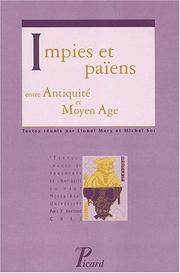
ISBN: 2708406701 2369430575 9782708406704 Year: 2002 Volume: 2 Publisher: Paris: Picard,
Abstract | Keywords | Export | Availability | Bookmark
 Loading...
Loading...Choose an application
- Reference Manager
- EndNote
- RefWorks (Direct export to RefWorks)
The evolution of the concept of impiety and paganism from the Classical period to early Christian times.
Christianity and culture --- Paganism --- Literature, Medieval --- Christianisme et civilisation --- Paganisme --- Littérature médiévale --- History --- Relations --- Christianity. --- History and criticism. --- Histoire --- Christianisme --- Histoire et critique --- Civilization, Pagan --- Heathenism --- History and criticism --- Relations&delete& --- Christianity --- Religions --- Christianity and culture - History - Early church, ca 30-600 --- Paganism - Relations - Christianity. --- Literature, Medieval - History and criticism.
Book
ISBN: 9782251445649 2251445641 Year: 2016 Publisher: Paris Belles lettres
Abstract | Keywords | Export | Availability | Bookmark
 Loading...
Loading...Choose an application
- Reference Manager
- EndNote
- RefWorks (Direct export to RefWorks)
Le christianisme a-t-il été une menace pour la culture gréco-romaine ? Audelà de ce questionnement, ce livre engage une réflexion sur le rapport du christianisme naissant avec l'idée même de culture, telle qu'elle existait avant le christianisme et telle qu'elle s'est modifiée par la suite. En passant en revue chacune des disciplines du septénaire constituant les arts libéraux, c'est-à-dire le socle culturel de tout lettré que les Grecs nomment egkuklios paidéia (grammaire, rhétorique, dialectique, arithmétique, géométrie, musique, astronomie), ce livre montre que, si la culture grecque suscite des oppositions R elle apparaît souvent comme l'expression du polythéisme ou des prétentions des Grecs à atteindre le savoir sans Dieu -, elle peut aussi être défendue par les chrétiens en tant qu'elle forme l'esprit et le rend capable de comprendre les données de la foi. Les auteurs patristiques reprennent ainsi à leur compte une conception ancillaire de la culture qui avait déjà cours dans certains courants philosophiques grecs, mais qui suppose un tri : la culture peut servir d'introduction à la foi, à condition qu'on n'en prenne que ce qui est bon. Mais au-delà de cette réflexion qui vise à déterminer ce qui, de la culture, doit être sauvé ou rejeté, les auteurs chrétiens tendent à présenter la doctrine chrétienne comme une culture à part entière, et dissocient pour la première fois dans l'histoire la notion de culture de celle d'hellénisme. Paradoxalement peut-être, ils donnent ainsi corps à une idée de culture globale dont christianisme et hellénisme n'apparaissent en définitive que comme deux composantes possibles. La réflexion des auteurs chrétiens aboutit donc à la fois à une relativisation du concept de culture R passage de la culture, forcément grecque, aux cultures, la grecque et les barbares R et à son extension R passage de telle ou telle culture à la culture en général : devient " culture " tout ce qui contribue à nourrir l'esprit, qu'il soit grec ou non. Le christianisme, à l'issue de cette étude, n'apparaît plus tant comme un obstacle à la transmission de l'idéal grec et romain de culture que comme un vecteur essentiel dans la façon dont la notion de culture s'est frayée un chemin jusque dans la Modernité.
Christianity and culture --- Christianisme et civilisation --- History --- Histoire --- 27 "00/05" --- Kerkgeschiedenis--?"00/05" --- Christianisme et culture --- Civilisation chrétienne --- Hellénisme --- Influence hellénistique --- Influence --- Antiquité. --- Christentum. --- Christianisme. --- Culture. --- Hellénisme. --- Kultur. --- Littérature chrétienne primitive --- Littérature chrétienne primitive. --- Église primitive (30-600). --- Early church. --- Auteurs grecs --- Influence hellénistique. --- 30-600. --- Christian church history --- anno 1-499 --- anno 500-599 --- Christianity and culture - History - Early church, ca 30-600
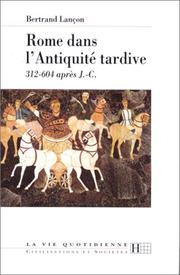
ISBN: 2012351158 9782012351158 Year: 1995 Publisher: Paris Hachette
Abstract | Keywords | Export | Availability | Bookmark
 Loading...
Loading...Choose an application
- Reference Manager
- EndNote
- RefWorks (Direct export to RefWorks)
Rome --- Rome (Italy) --- Rome (Italie) --- History --- Social life and customs --- Civilization --- Histoire --- Moeurs et coutumes --- Civilisation --- Histoire romaine --- --IVe-VIe s., --- Rome ancienne --- --Christianity and culture --- Christian influences --- Christianity and culture --- -Contextualization (Christian theology) --- Culture and Christianity --- Inculturation (Christian theology) --- Indigenization (Christian theology) --- Culture --- -Rome --- -Civilization --- -Christian influences. --- -History --- Europe --- Christian influences. --- IVe-VIe s., 301-600 --- Christianity and culture - History - Early church, ca 30-600 --- Rome - History - Empire, 284-476 --- Rome - Civilization - Christian influences
Book
ISBN: 8834308948 9788834308943 Year: 2003 Volume: 23 Publisher: Milano Vita e pensiero
Abstract | Keywords | Export | Availability | Bookmark
 Loading...
Loading...Choose an application
- Reference Manager
- EndNote
- RefWorks (Direct export to RefWorks)
Christian life --- History --- Primitive and early church, ca. 30-600 A.D. --- Christianity and culture --- Christian sociology --- Early christian, ca. 30-600 --- Church history --- Civilization [Greco-Roman ] --- Civilization, Greco-Roman --- 270.1 --- Greco-Roman civilization --- Civilization, Classical --- Apostolic Church --- Christianity --- Church, Apostolic --- Early Christianity --- Early church --- Primitive and early church --- Primitive Christianity --- Fathers of the church --- Great Apostasy (Mormon doctrine) --- Religion Christian Church history Apostolic period to 325 --- Civilization, Greco-Roman. --- Christian life - History - Early church, ca 30-600 --- Christianity and culture - History - Early church, ca 30-600 --- Christian sociology - History - Early church, ca 30-600 --- Church history - Primitive and early church, ca. 30-600 --- Antiquite et christianisme
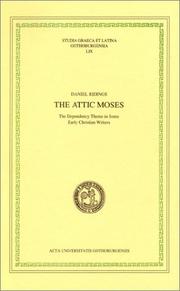
ISBN: 9173462756 9789173462754 Year: 1995 Volume: 59 Publisher: Göteborg : Acta universitatis Gothoburgensis,
Abstract | Keywords | Export | Availability | Bookmark
 Loading...
Loading...Choose an application
- Reference Manager
- EndNote
- RefWorks (Direct export to RefWorks)
Ancient philosophy --- Antieke filosofie --- Filosofie [Antieke ] --- Filosofie [Griekse ] --- Filosofie [Romeinse ] --- Filosofie van de Oudheid --- Greek philosophy --- Griekse filosofie --- Philosophie ancienne --- Philosophie antique --- Philosophie de l'Antiquité --- Philosophie grecque --- Philosophie romaine --- Philosophy [Ancient ] --- Philosophy [Greek ] --- Philosophy [Roman ] --- Roman philosophy --- Romeinse filosofie --- Christianity and culture --- Civilization, Classical --- Christianisme et civilisation --- Civilisation ancienne --- History --- Histoire --- Clement, --- Eusebius, --- Theodoret, --- Civilization, Classical. --- 276:22 --- -Civilization, Classical --- Classical civilization --- Civilization, Ancient --- Classicism --- Contextualization (Christian theology) --- Culture and Christianity --- Inculturation (Christian theology) --- Indigenization (Christian theology) --- Culture --- Patrologie en exegese --- -Clement of Alexandria, Saint --- Eusebius of Caesarea, Bishop of Caesarea --- Theodoret Bishop of Cyrrhus --- 276:22 Patrologie en exegese --- Primitive and early church, ca. 30-600 A.D. --- Philosophy and religion --- Theology [Doctrinal ] --- Christianity and culture - History - Early church, ca 30-600
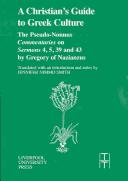
ISBN: 0853239177 1789628547 9780853239178 Year: 2001 Volume: 37 Publisher: Liverpool: Liverpool university press,
Abstract | Keywords | Export | Availability | Bookmark
 Loading...
Loading...Choose an application
- Reference Manager
- EndNote
- RefWorks (Direct export to RefWorks)
Sermoenen [Vroeg-christelijke ] --- Sermons [Early Christian ] --- Sermons chrétiens primitifs --- Sermons, Early Christian --- Christianity and culture --- Christianisme et civilisation --- History --- Histoire --- Gregory, --- Allusions --- Sermons, Early Christian. --- Allusions. --- Sermons chrétiens primitifs --- Early Christian sermons --- Christian literature, Early --- Bogoslov, Grigoriĭ, --- Bogoslov, Grigorije --- Grégoire, --- Gregor, --- Gregorio, --- Gregorio Nazianzeno, --- Grēgorios, --- Gregorios, --- Gregorius, --- Gregorius Nazianzenus, --- Gregory Nazianzen, --- Grigol, --- Grigorie, --- Grigoriĭ, --- Grigoriĭ Bogoslov, --- Ighrīghūriyūs, --- Nazianz, Gregor von, --- Nazianzen, Grigoriĭ, --- Nazianzenus, Gregorius, --- Nazianzus, Gregory of, --- Sfântul Grigorie, --- Богослов, Григорий, --- Григорий, --- Григорий Богослов, --- Γρηγόριος, --- Gregory of Nazianzus --- Primitive and early church, ca. 30-600 A.D. --- Grego., --- Nazian., Grego., --- Christianity and culture - History - Early church, ca 30-600 --- Gregory, - of Nazianzus, Saint - Sermons --- Gregory, - of Nazianzus, Saint - Allusions --- Gregory, - of Nazianzus, Saint
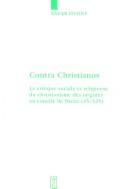
ISBN: 9783110195545 3110195542 3110934892 Year: 2012 Volume: Beiheft 146. Publisher: Berlin ; Boston : De Gruyter,
Abstract | Keywords | Export | Availability | Bookmark
 Loading...
Loading...Choose an application
- Reference Manager
- EndNote
- RefWorks (Direct export to RefWorks)
The persecution of the Church ordered by the Roman State, whether it was by local magistrates or on imperial command, was the most visible manifestation of the hostility directed against Christians during the first three centuries of our era. In reality however, this persecution, more virulent in some of its episodes than in others, was merely the crystallisation of the rejection of Christianity already expressed by the population at large. Christianity, spreading rapidly beyond its original Jewish context, was perceived by Graeco-Roman society through the deforming lens of ideas and values entirely foreign to it. For this reason, Christians became the victims of religious and social categorisations which forced them into the margins of society. Christianity's assimilation with superstition (Jewish origins, irrational doctrine, recruitment from the masses, doubtful practices [magic, anthropophagy, ritual murder, sexual debauchery, Christ-worship, cross-worship, sun-worship, ass-worship]) and the accusations against it of atheism (a reaction against its exclusive monotheism) and of 'hatred of mankind' (non-adherence to the common values [civil, familial or political]) reveal that public opinion played a crucial role preceding the measures taken against Christians, and that the anti-Christian hostility was a reactionary movement against a group that threatened the basic structures of the City.
Christianity and culture --- Christianity --- Church history --- Christianity and other religions --- Judaism --- Persecution --- Christianisme et civilisation --- Christianisme --- Eglise --- Judaïsme --- Persécutions --- History --- Controversial literature --- History and criticism. --- Relations --- Histoire --- Ouvrages de controverse --- Histoire et critique --- History and criticism --- 27 <37> "00/04" --- Christians --- Religious persecution --- Atrocities --- Jews --- Religions --- Semites --- Syncretism (Christianity) --- Apostolic Church --- Church, Apostolic --- Early Christianity --- Early church --- Primitive and early church --- Primitive Christianity --- Fathers of the church --- Great Apostasy (Mormon doctrine) --- Kerkgeschiedenis--Rome. Oud-Italië--?"00/04" --- Persecutions --- Religion --- Judaïsme --- Persécutions --- Christianity and culture - History - Early church, ca 30-600 --- Christianity - Controversial literature - History and criticism --- Church history - Primitive and early church, ca. 30-600 --- Christianity and other religions - Judaism - History - To 1500 --- Judaism - Relations - Christianity - History - To 1500 --- Persecution - Rome --- Paganisme et christianisme --- Juifs et chrétiens --- Early Christianity. --- New Testament. --- persecution.
Book
ISBN: 9782251381008 2251381007 Year: 2010 Volume: 102 Publisher: Paris Les Belles Lettres
Abstract | Keywords | Export | Availability | Bookmark
 Loading...
Loading...Choose an application
- Reference Manager
- EndNote
- RefWorks (Direct export to RefWorks)
Religious tolerance --- Christianity and culture --- Freedom of religion --- Christianity and other religions. --- Tolérance religieuse --- Christianisme et civilisation --- Liberté religieuse --- Christianisme --- History --- Histoire --- Relations --- Rome --- Religion. --- Religion --- Intolérance --- --Rome ancienne --- --Christianisme --- --Liberté religieuse --- --Religion --- --Religious tolerance --- Christianity and other religions --- Tolérance religieuse --- Liberté religieuse --- Tolerance, Religious --- Toleration --- Freedom of worship --- Intolerance --- Liberty of religion --- Religious freedom --- Religious liberty --- Separation of church and state --- Freedom of expression --- Liberty --- Christianity --- Syncretism (Christianity) --- Religions --- Law and legislation --- Tolérance religieuse - Rome --- Christianisme et civilisation - Histoire - ca 30-600 (Eglise primitive) --- Liberté religieuse - Rome --- Christianisme - Relations --- Rome ancienne --- Religious tolerance - Rome --- Freedom of religion - Rome --- Christianity and culture - History - Early church, ca 30-600 --- Rome - Religion --- Rome - Histoire - 284-476 (Bas-Empire) --- Late Roman history - Intolerance - 3th-4th centuries. --- Religion et État --- Tolérance --- 284-476 (Bas-Empire) --- Histoire religieuse
| Listing 1 - 10 of 17 | << page >> |
Sort by
|

 Search
Search Feedback
Feedback About
About Help
Help News
News